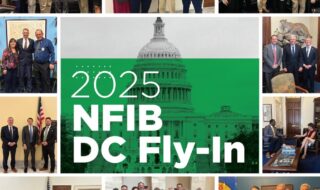Corporate Transparency Act Would Add $5.7 billion in Regulatory Costs for America’s Small Businesses, According to NFIB Study
Corporate Transparency Act Would Add $5.7 billion in Regulatory Costs for America’s Small Businesses, According to NFIB Study
September 23, 2019
WASHINGTON, D.C. (Sept. 23, 2019) — Small businesses would face $5.7 billion in new regulatory costs and an additional 131.7 million hours of paperwork if H.R. 2513, the Corporate Transparency Act of 2019, is signed into law. The figures were released today as part of an NFIB study that provides annual and ten-year approximations of the costly effects of the proposed legislation.
“This study quantifies the concerns small business owners have over the Corporate Transparency Act,” said Brad Close, NFIB’s Senior Vice President, Public Policy. “The bottom line is that small business owners simply cannot afford the additional compliance costs and security risks that the Corporate Transparency Act imposes. While we appreciate efforts to discourage wrongdoers from taking advantage of U.S. companies, Congress must not create undue burdens on those who can least afford them or put small business owners’ private information in jeopardy.
The Corporate Transparency Act of 2019 would require small corporations and limited liability companies with 20 or fewer employees to complete and submit paperwork which includes the personally identifiable information of each business owner, to the Treasury Department’s Financial Crimes Enforcement Network upon the creation of the business and periodically for the life of the business. Failure to comply is a federal crime with civil penalties up to $10,000 and criminal penalties of up to three years in prison.
H.R. 2513 not only imposes a significant resource and cost burden on small business owners that they are not equipped to absorb but puts the private information of each owner at an increased risk of abuse or hacks. NFIB’s study found that if the Corporate Transparency Act became law in 2020:
- More than 4.9 million businesses would be required to provide personal ownership information to FinCEN on an annual basis.
Under this bill, the Treasury Department would be required to retain the information for the life of the business plus five years. Furthermore, it grants broad access to the information to federal, state, local, or tribal law enforcement agencies through a simple request.
According to NFIB’s 2016 Small Business Problems and Priorities survey, small businesses report that the burden of federal paperwork ranks in the top 20% of the problems they face. The paperwork burden imposed by this legislation is significant:
- The annual cost of compliance would be equivalent to an annual average of $573 million in monetized regulatory costs.
- The 10-year cost of compliance is a cumulative $5.7 billion in new regulatory costs.
- Small businesses would be required to complete an annual average of 13.2 million hours of additional paperwork per year from 2022 to 2031 in order to remain compliant.
- The 10-year cost of paperwork compliance hours is estimated to be a cumulative 131.7 million new paperwork hours.
At a business with 20 or fewer employees, the small business owner is frequently the individual who fills out and files the paperwork, which means that time is taken away from the owner’s daily tasks of operating his or her business.
To read the full study and the methods used for estimation, please click here.
NFIB is a member-driven organization advocating on behalf of small and independent businesses nationwide.
Related Articles














